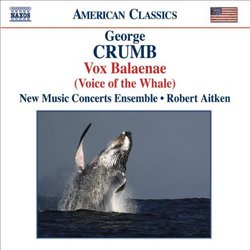| All Artists: George Crumb, New Music Concerts Ensemble, David Swan, Teri Dunn Title: George Crumb: Vox Balaenae (Voice of the Whale) Members Wishing: 1 Total Copies: 0 Label: Naxos American Original Release Date: 1/1/2006 Re-Release Date: 12/12/2006 Genres: Pop, Classical Styles: Vocal Pop, Opera & Classical Vocal, Chamber Music, Historical Periods, Classical (c.1770-1830) Number of Discs: 1 SwapaCD Credits: 1 UPC: 636943920527 |
Search - George Crumb, New Music Concerts Ensemble, David Swan :: George Crumb: Vox Balaenae (Voice of the Whale)
 | George Crumb, New Music Concerts Ensemble, David Swan George Crumb: Vox Balaenae (Voice of the Whale) Genres: Pop, Classical
|
Larger Image |
CD Details |
CD ReviewsGeorge Crumb on Naxos Robin Friedman | Washington, D.C. United States | 02/06/2007 (5 out of 5 stars) "The Naxos "American Classics" series continues to offer invaluable introductions to American art music, from the traditional to the avant garde. This Naxos release of music by the American composer George Crumb (b.1929) falls in the latter category. It is the second release on Naxos of music by this intriguing, taut, and serious composer. The earlier Naxos CD, released in mid-2006, featured Crumb's setting of poetry by Federico Lorca, "Songs, Dances, and Refrains of Death" performed by the Arte Nouveau Ensemble. This second release is performed by the New Music Concerts Ensemble, a Toronto group which champions new music, led by flutist Robert Aiken. It includes a short song cycle together with three important chamber works. The program notes are by Crumb himself.
Crumb's music is dramatic and programmatic. His themes include nature, death, and religious mysticism. Crumb's music uses unusual instruments and effects and also uses standard western instruments in novel ways. His works place great emphasis on the timbre -- the qualities -- of the varied instrument and of the human voice. It is spare and minimalist. Lorca's anguished poetry brings out the best in Crumb. This CD to features a setting of Lorca, but in a lighter vein than Crumb's other works. In 1986, after eight separate settings of Lorca poems including his most famous work, "Ancient Voices of Children," Crumb set a series of seven Lorca poems written for children, titled "Federico's Little Songs for Children." The cycle is performed by Canadian soprano Teri Dunn to the accompaniment of flute and harp. In the seven songs, Robert Aitken performs on four different kinds of flute, including the bass and alto flute and the piccolo, while harpist Erica Goodman likewise exploits the full timbre and range of her instrument. The songs vary in style from the serious to the whimsical, as Dunn alternately sings, declaims, whispers, shouts and snarls through the varied passages of Crumb's score. The text of the songs and translations are offered on the Naxos web site. Crumb's 1971 composition, "Vox Balaenae" exemplifies his love of nature and of the theatrical. Crumb directs each of the three performers to wear a black half-mask to "effac[e] a sense of human projection [and] represent, symbolically, the powerful impersonal forces of nature." The music is inspired by a tape of the singing of the humback whale and is scored for flute, cello, and piano, each electronically amplified. The music is a lament for the fate of the whale in the face on an increasingly hostile environment created by human beings. In hearing this work, I thought of Rautavaara's "Cantus Arcticus" which, in fact, uses a tape or songs of Arctic birds, and of Alan Hovhaness's "And God Created Great Whales" which explores themes similar to Crumb's work. (Although we writes in a more accessible, popular style, Hovhaness seems to me to share many of Crumb's themes and preoccupations.) The "Eleven Echoes of Autumn" composed in 1965 for violin, alto flute, clarinet and piano, features three short movements for flute violin, and cello, respectively leading to a stormy climax and then fading away. This chamber work too is inspired by Lorca, as the performers are instructed to whisper a Lorca text, "and the broken arches where time suffers" at several points in the score. The final work on this CD is the "Idyll for the Misbegotten" composed in 1986. The work is scored for flute and percussion and rises to moments of deep force and intensity. Crumb writes that 'misbegotten' "well describes the fateful and melancholy predicament of the species homo sapiens at the present moment in time" as human beings have set themselves in opposition to nature rather than attempt to live harmoniously within nature. (Crumb here offers a restatement of the human predicament, while holding on to only one end of it.) This work as well includes whispers and vocal asides from the performers as they are instructed to intone lines from an eight-century Chinese poet: "The moon goes down. There/are shivering birds and/ withering grasses." This Naxos CD offers an excellent opportunity for the adventurous listener to explore the difficult and strangely moving music of George Crumb. Robin Friedman" |

 Track Listings (10) - Disc #1
Track Listings (10) - Disc #1